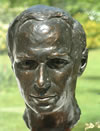
Max Nicholson
Introduction to "The Place of Conservation" - a chapter in "The Humanist Frame" (George Allen and Unwin, 1961)
| Home |

Max Nicholson Introduction to "The Place of Conservation" - a chapter in "The Humanist Frame" (George Allen and Unwin, 1961) |